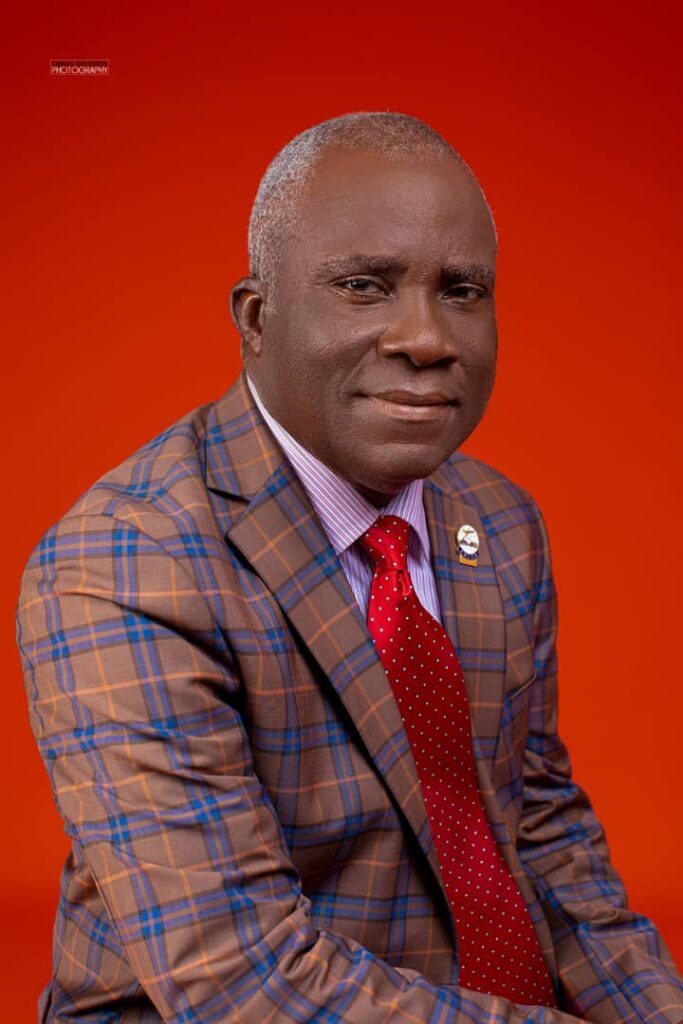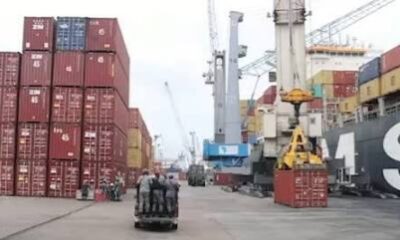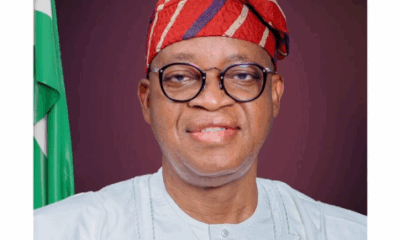Analysis
The Imperative of Refocusing CRFFN for Unity and Independence

BY EGUONO ODJEGBA

Minister Oyetola
It is public knowledge that a deep seated, age long rivalry exists between the leading, pioneer, parent body of licensed customs agents known as the Association of Nigeria Licensed Customs Agents (ANLCA) and its sister breakaway body, which took on the identity of freight forwarder and known as the National Association of Government Approved Freight Forwarders (NAGAFF).
Tolerance has been the watch word between the two since the formation of the Council for the Registration of Freight Forwarding in Nigeria (CRFFN), as part of the five Accredited Associations.
Industry observers can attest to the fact that this rivalry has flared up from time to time, and manifested in the most repulsive and vaulting dimension and yet ebbed in the silliest compromise when the then federal ministry of transport announced plans to annex the Council with a promise to funding its activities.
The dangling of financial expectations was believed to have produced a compromise of subdued clashes in their occasional war of interests. This was the prevailing atmosphere until the recent appointment of Mr. Kingsley Igwe, a member of NAGAFF as the Acting Registrar of CRFFN by the Minister of Marine and Blue Economy, Adegboyega Oyetola.
In other climes, freight forwarders and associations operate as respected groups of practitioners and bring much impact to the growth of the national economy without necessarily become an appendage of the political system.
Nigeria has a unique model where the CRFFN serves as both a professional regulator and a quasi-governmental body. This dual identity has led to turf wars between NAGAFF and ANLCA, and or between NAGAFF, ANLCA and the other smaller groups; which has created space for political interference.
The bickering unfortunately reached an unacceptable, dangerous and unimaginable pitch few days ago when NAGAFF moved for the disbandment and delisting of ANLCA and three other Accredited Associations of the CRFFN, for daring to call the CRFFN and its leadership, who is a member of NAGAFF to order.
This call signpost a gradual slip into a state of confusion and anarchy in the freight forwarding industry which must be quarantined and treated if the future of the industry must be protected.

ANLCA President, Nwokeoji
According to informed opinions and industry professionals, the presence of the federal government in the CRFFN is a major stumbling block that will continue to disrupt and distort the professional focus of the CRFFN, also referred to as the Council.
Indeed, pundits say the participation of government in the Council makes it more of a political organ as against a professional body of practitioners. Since inception, the Council has been dogged by one controversy or the other arising especially from political interference by the government.
To eliminate this infighting among freight forwarding associations, especially between NAGAFF and ANLCA, and the others and to reduce federal government interference—it is advised that the CRFFN be restructured.
———————————-
To achieve a rancour free reform, the following steps are worth considering:
Decouple CRFFN from Political Influence
CRFFN Act should be reviewed comprehensively with a focus to returning the Council as a professional body rather than an extension of government business. This should include the transition of the CRFFN into a self-funding, autonomous professional body much like the Nigeria Bar Associations (MBA), Council of Registered Engineers of Nigeria (COREN), and the Medical Association of Nigeria (MBA), among others.
Urgent and deliberate steps must also be taken to eliminate reliance on federal allocations and instead adopt a membership-based funding model, with transparent fee structure, both in collection and expenditure.
CRFFN Leadership

Aniebonam, Founder NAGAFF
The Federal Ministry of Marine and Blue Economy must excuse itself from the leadership affairs of the Council, either during elections or in the day-to-day running of its affairs. Members should strive to ensure that leadership positions are filled through democratic elections supervised by neutral bodies—not government appointees.
Strengthen Licensing and Compliance
CRFFN should enforce a uniform licensing regime for all practicing freight forwarders, regardless of association. In the same vein, efforts should focus on introducing tiered certification levels to recognize expertise and specialization in areas like sea freight, customs brokerage, or aviation logistics.
To commit to professionalism, mandatory continuing professional development (CPD) should be enforced to maintain license validity. This should be in addition to creating a Unified Industry Code of Conduct to help neutralize internal wrangling.
Professional Collaboration
As recently demonstrated by the Nigeria Shipowners Association (NISA), CRFFN should develop an internal disciplinary mechanism to host joint disciplinary tribunals with representatives from multiple associations to adjudicate infractions fairly.
By extension, the CRFFN should consider setting up a standing Stakeholders Engagement Committee (SEC) drawn from representatives of ANLCA, NAGAFF, AREFFN, NAFFAC etc, and to resolve disputes and draft joint policies. For efficiency and transparency, the proposed committee leadership should be rotated annually to promote inclusivity and prevent dominance.
Like the ANLCA keep- fit health sporting model recently created by Meers Segun Oduntan and Femi Anifowose, CRFFN should create a Freight Forwarding Week—a national industry event to foster unity through exhibitions, lectures, and networking.
Reliable Register
Plan should be undertaken to digitize CRFFN’s registration, training, and compliance systems to eliminate manual bottlenecks and corruption. Introduce an industry dashboard showing KPIs like turnaround time, compliance rates, and training participation.
Legislative Reform

Amiwero, Founder Council
Amend the CRFFN Act to clearly define its professional regulatory role, and to distinguish it from administrative functions. The reform should also reinforce provisions that protect autonomy and prohibit undue interference from ministries or political actors.
Above, hopefully, would align with international trade agreements to elevate Nigeria’s reputation and access to logistics partnerships. If Nigeria refocuses its model on professionalism, self-regulation and digitization, with emphasis on collaboration rather than competition—it can unleash enormous potential in this important sub sector.
——————————-
For those who may not have been following the developments and may have missed out in some areas, below is what has played out, so far, with the essential background to the saga.
CRFFN’s Role

The CRFFN was established by Act No. 16 of 2007 to regulate and control the practice of freight forwarding in Nigeria. It sets professional standards, promotes capacity building, and ensures compliance across sea ports, airports, and land borders.
Background
The recent tensions and class struggles has essentially been about Customs Brokers vs. Freight Forwarders.
The issues have been the distinction between customs brokers (licensed by the Nigeria Customs Service) and freight forwarders (regulated by CRFFN), which sparked debate over representation, recognition, and regulatory overlap.
The Table Shaker, Lucky Amiwero
The President of the National Council of Managing Directors of Customs Agents (NCMDCA), Mr. Lucky Amiwero, had recently petitioned the Presidency to clarify the professional dichotomy. He argued that customs brokers operate under a different legal framework and should not be subsumed under CRFFN’s freight forwarding umbrella.
In the meantime, he dragged CRFFN to the court seeking customs broker’s exemption from further payment of the controversial Practitioners Operating Fee (POF), which prayer was granted. Recall that the POF has been a sore item of contention from the inception of the CRFFN.
Recognition and Compensation
Despite their pivotal role in trade facilitation and revenue generation (e.g., contributing to over ₦6 trillion in customs revenue in 2024), both customs brokers and freight forwarders feel underappreciated. They’ve called for better recognition in national honors and financial frameworks, citing their contribution to compliance, duty collection, and trade facilitation.
Regulatory Overlap and Identity Crisis
The Nigeria Customs Service Act (2023) mandates that only licensed customs agents can transact with customs, while CRFFN regulates freight forwarding standards. This duality has led to confusion over jurisdiction and professional identity.
In the course of time, the professional identity crisis and disparity become issues of professional dichotomy and serious economic interest. Thus there gradually arose quiet nagging that snowballed into strident demand as customs brokers sought recognition as a distinct profession, not merely a subset of freight forwarding.
The issue gradually dovetailed into a larger scope requiring regulatory clarity and the eventual push for clearer delineation between CRFFN and Nigeria Customs Service mandates.
For purposes of clarity, the international frameworks like the WTO’s Trade Facilitation Agreement and WCO’s Revised Kyoto Convention support clearer roles and public-private partnerships, but in Nigeria, implementation remains murky.
Analysts has ascribed critical economic impact to the agitations, arguing that with customs agents enabling trillions in revenue generation into government coffers, their role in national development is undeniable—but still under-leveraged.
NAGAFF
After what looked like an eternity, unsure whether to get into the fray and defend its own, NAGGAFF earlier this week picked the gauntlet and jumped into the trench, smoking from all cylinders.
Its President, Chief Tochukwu Ezisi believed to be delivering a war letter from the Ayatollah of NAGAFF, the Essential Dr. Boniface Aniebonam, not only called out ANLCA but with inimitable effrontery, called for its deregistration by the Corporate Affairs Commission (CAC), for purportedly sabotaging the federal government by virtue of its fight with CRFFN.
Evidently, NAGAFF’s call for the delisting of ANLCA, alongside three other associations, is rooted in deep-seated regulatory and ideological differences within the freight forwarding ecosystem. To wit, NAGAFF accused these associations of undermining CRFFN’s authority and sabotaging reforms in the marine and blue economy sectors.
ANLCA, Ezisi argued aligned with the court judgment obtained by Lucky Amiwero that challenged CRFFN’s authority to regulate customs agents and collect POF, a matter the NAGAFF president said was tantamount to sabotage since according to him, the ruling is under appeal and therefore, not enforceable.
The Undertaker
Accusing ANLCA of playing to the gallery, Ezisi said the constraining CRFFN to legal interpretations and limitations is not only politically motivated, but intended as an affront against NAGAFF, since Kingsley Igwe the CRFFN Registrar was its member.
Uncommonly shrewd in competition, NAGAFF sought refuge behind government protection as it questioned ANLCA’s alleged sense of patriotism. At the Monday media briefing, NAGAFF also accused ANLCA of failure to meet its statutory financial obligations to CRFFN.
What is quite interesting in all of this is that NAGAFF framed the issue as one that is protecting government reforms and ensuring regulatory compliance.
Since ANLCA is yet to respond, the tension is palpable and watchers of industry development appear enveloped in suspense. This is more so as the supervising ministry of marine and blue economy has so far, maintained sealed lip.
Like one that is adept at fishing in trouble waters, NAGAFF threw the spoiler net when it accused ANLCA of disobedience to regulatory power in its suggestion that if associations actively undermine the regulator they are accredited by, thus raising questions about their legitimacy and commitment to industry ideals and standards.
Those who are repository of happenings in the slippery relationship that exists between the twosome groups say NAGAFF was the first to drag CRFFN to court for similar regulatory breach.
Evaluating the Call for Proscription
The developments also raises question on industry fragmentation as deregistration canvassed by one of the feuding associations could deepen divisions and weaken collective advocacy in the freight forwarding sector.
Importantly, proscribing professional bodies could violate constitutional rights unless due process is followed.
Is NAGAFF Acting in Good Faith?
This question is logically one of the first, and is sharp and enabling—because it gets to the heart of whether NAGAFF’s actions are driven by genuine concern for industry growth or merely a manifestation of rivalry and power dynamics. To assess good faith, we look at intentions, transparency, and alignment with public interest.
NAGAFF claims it is protecting the integrity of CRFFN, and that ANLCA and others are undermining CRFFN’s authority. In a simplistic manner, NAGAFF calling for action could be seen as defending institutional order. But somewhere, there has been a quiet whispering that NAGAFF once dragged CRFFN to court like ANLCA did just recently.
Thus far, between ANLCA and NAGAFF, surely one must be playing the nationalistic script, while the other must be pandering to self interest.
Bottom Line
NAGAFF’s call for ANLCA’s deregistration is a bold and controversial move that reflects deeper tensions over regulatory control, professional identity, and political influence within the freight forwarding landscape.
And because reputation matters, industry players, policy makers and watchers of events can discern for themselves what is true and false, what is healthy and self-serving.
It is up to the supervising ministry to rise to the occasion whether to continue to hang on to CRFNN as a political ornament that brings nothing but headache; or give it up for the healing and up-building of the subsector, together with all its accoutrements.



































